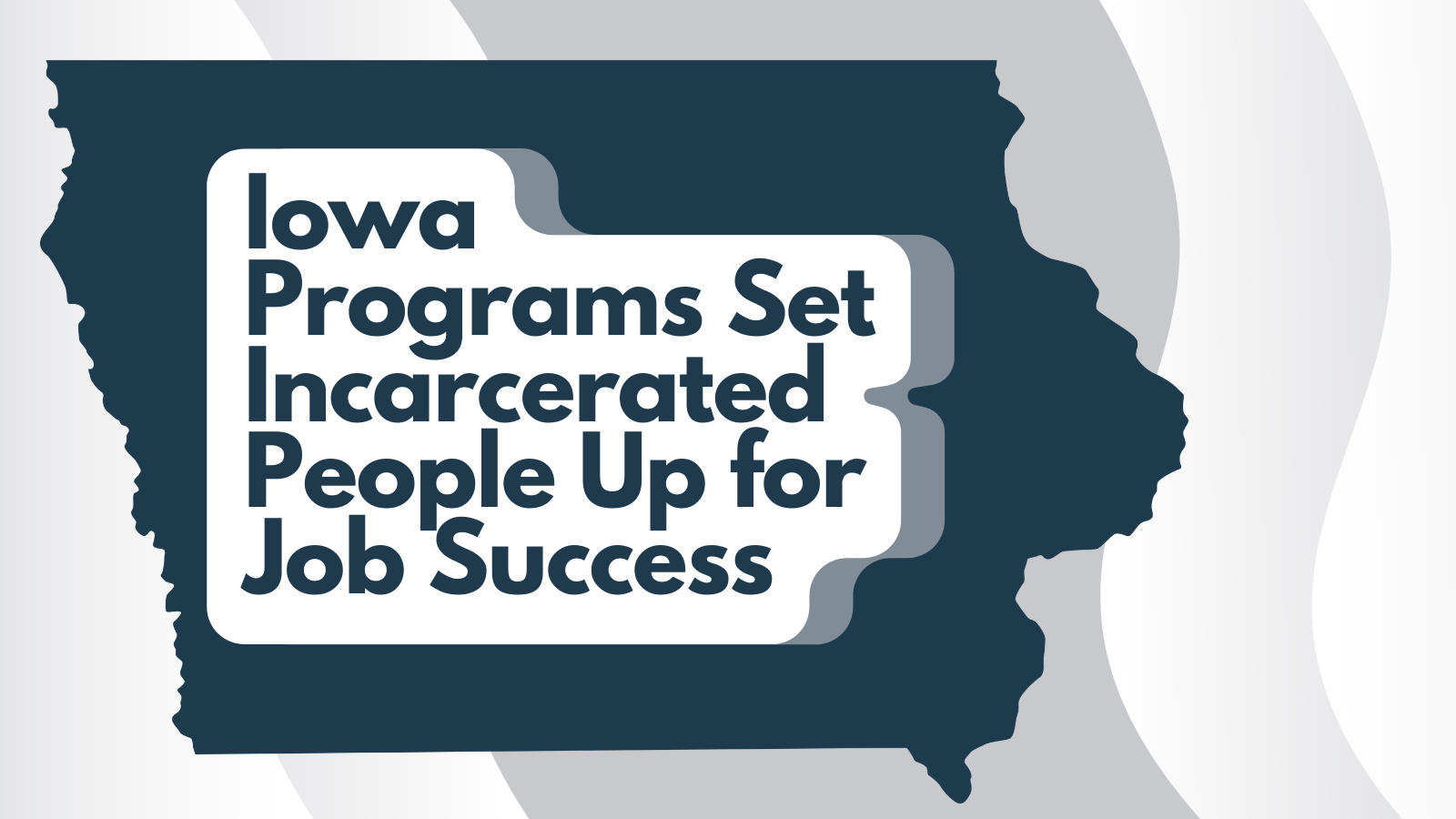Gainful, stable employment is a protective factor for individuals reentering the community after incarceration, providing them with a financial means to support themselves and a sense of responsibility and accountability. This may be especially true for individuals in recovery from mental or substance use disorders, as “purpose”—participating in meaningful daily activities—is one of the four major dimensions of recovery. Employment can also support the other three dimensions of recovery: “community,” which can be gained through being part of a workplace; and “health” and “home,” which can be supported and enabled with the income and benefits one gains from stable employment.
In Iowa, a number of career pathway programs managed through Iowa Workforce Development, in partnership with the Iowa Department of Corrections (DOC), are focused on helping individuals who have been incarcerated prepare for and acquire jobs. “Thousands of incarcerated people are released from Iowa prisons each year,” says Richelle Seitz, OWDS-I, reentry operations manager for Iowa Workforce Development. “Without a job, it is nearly impossible for these individuals to establish a new life. A job can help an individual more readily integrate into society so they can become self-sufficient and successful in their lives.”
There are about 8,200 people in prisons in Iowa on any given day, and in 2023, Iowa Workforce Development programming served about 2,500 of them. While there is no prison-based workforce programming specifically for individuals with behavioral health concerns, many of the state’s incarcerated individuals have mental or substance use disorders and can benefit from career development. According to a 2017 study, almost half of people incarcerated in the Iowa prison system were diagnosed with a mental illness (48 percent), of whom 29 percent had a serious mental illness (41 percent of all females and 27 percent of all males), and 26 percent had a history of a substance use disorder.
Returning Citizen Initiative
One Iowa Workforce Development program, the Returning Citizen Initiative, is focused on supporting reentry populations in returning to the workforce after incarceration or, for many, entering it for the first time. The goal of this initiative is to connect people to employment prior to release, which may mean a scheduled job interview or even a job offer for those who are able to apply and interview while still incarcerated.
Through this voluntary program, anyone in the six participating Iowa prisons who wants career or employment support is welcome to join. Reentry career planners work with incarcerated individuals to build or revise their resumes, engage in career exploration programming using the O*NET Online career exploration tool, and connect to education (e.g., high school equivalency test or community college) that will help them get the jobs of their choice. This process includes working with people to think about what career they are suited to, what would feel meaningful to them, and what types of supports and resources would be available to them if needed (e.g., workplace benefits and community services). Individuals engaged in the Returning Citizen Initiative are offered the National Career Readiness Certificate.
“We are really working toward sustainable careers,” says Seitz. “Historically with this population, when they get out of prison, they are desperate to get any job so they don’t end up back in prison. We work with them while they are still incarcerated to seek careers that set them up to succeed. That means employers or occupations that are ‘second chance’ friendly, for instance, and those that pay a livable wage so people don’t have to work two or three jobs just to survive.”
The Returning Citizens Initiative has several staff that are Offender Workforce Development Specialist (OWDS) certified. Individuals with this certification have expertise in career development for those coming out of incarceration. The OWDS approach puts a special emphasis on addressing all of the barriers to employment that people face upon reentry, such as mental and physical health issues, substance use, housing, food insecurity, and other concerns.
Prison-Based Registered Apprenticeship Program
Additionally, the Iowa DOC offers registered apprenticeship programs for incarcerated men and women. Iowa Workforce Development staff serve as sponsors to these programs, helping people complete testing, manage the administrative tasks required to participate, and complete the on-the-job training and classroom instruction required for the job they want. Currently, there are more than 30 apprenticeships available to incarcerated people across Iowa’s 9 prisons, including cabinetry, carpentry, computer operations, and welding. “Upon completion of the apprenticeship, we hand the person over to an IowaWORKS office (American Job Centers), which works to connect them to an employer sponsor who is willing to take them on as an apprentice,” says Seitz. The following statistics are taken from the DOC’s 2023 annual report:
- 71 percent of apprentices that completed their apprenticeship were employed post-release compared to 44 percent of individuals released who did not participate in an apprenticeship; and
- 83.7 percent of apprentices that completed their apprenticeship reentered the community and did not recidivate.
- Individuals who completed their apprenticeship reported a 30 percent increase in wages, compared to individuals who did not participate in an apprenticeship.
The registered apprenticeship program is available to all incarcerated people, including those serving life or long-term sentences.
Incentives and Benefits for Employers
Seitz and her team from Iowa Workforce Development work with employers to build relationships and support for job seekers coming out of prison. “We are constantly educating employers about the benefits of hiring individuals coming out of incarceration,” she says. For instance, people coming out of prison in Iowa are usually on parole status, meaning they have a lot of support and structure built into their lives, including drug screens, check-ins with their parole officers, and a high level of oversight and accountability. Additionally, some state and federal programs provide incentives to employers to encourage employers to consider hiring formerly incarcerated individuals in Iowa. These include the following:
- the Federal Bonding Program, which provides an employer with free insurance for loss of money or property related to an employee with a criminal record for the first 6 months of their employment;
- the federal Work Opportunity Tax Credit, which offers a federal tax credit of up to $2,400 for every new hire that has been convicted of a felony; and
- the Iowa state tax credit, which provides a state tax credit of up to 65 percent of wages paid to an individual with a criminal conviction in the first 12 months of employment (up to a max of $20,000 per employee).
“Previously incarcerated people can be some of the most dedicated and productive employees. They are overwhelmingly dependable and punctual, and the turnover rate is typically low,” says Seitz. “They just need to be given a chance.”
For more information, email Shelley Seitz.
Like what you’ve read? Sign up to receive the monthly GAINS eNews!



